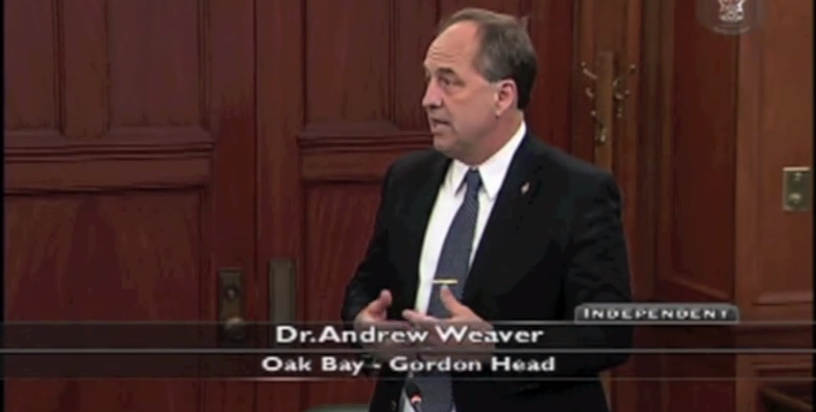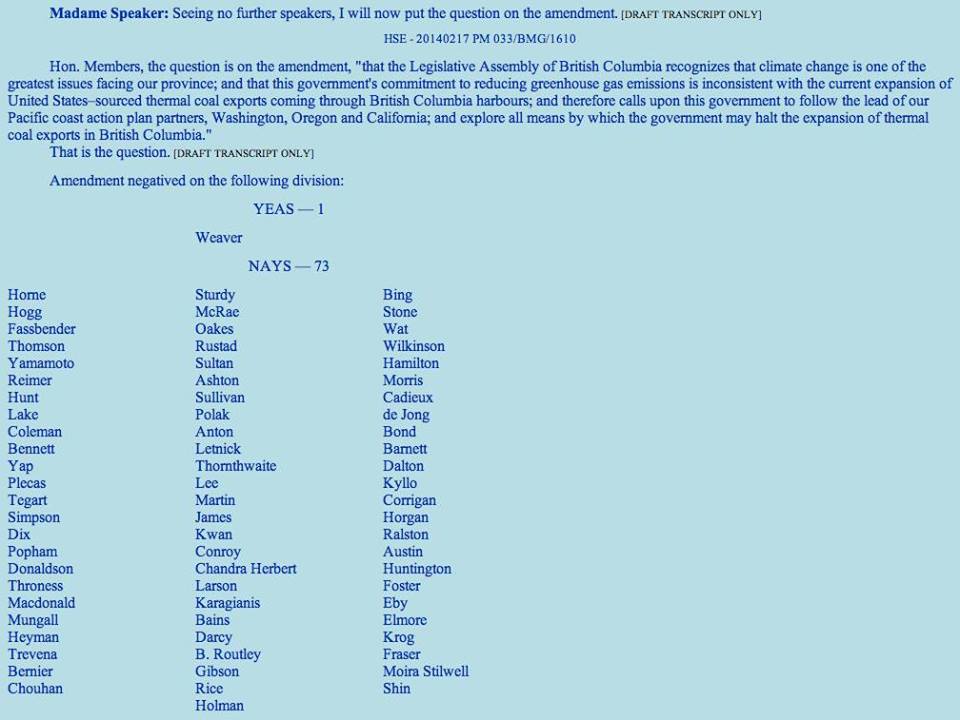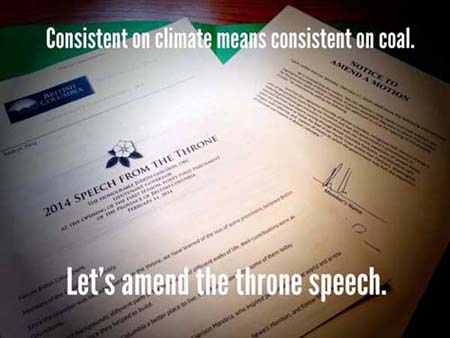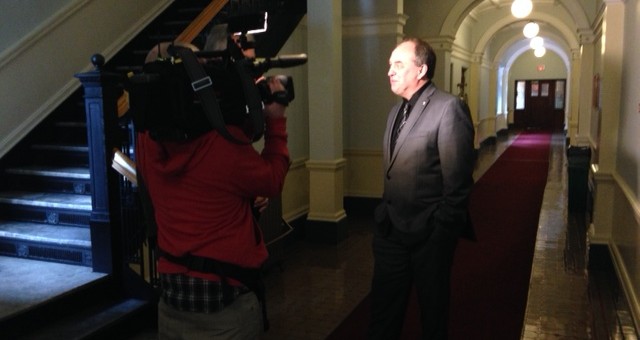Media
Putting Climate Targets Back Into the Throne Speech
On the floor of the House Andrew Weaver spoke to his motion to amend the Throne Speech, highlighting the government’s inconsistency in greenhouse gas targets. Under the province’s climate targets the legislated goal is to reduce emissions from the current 62 megatons of carbon pollution to 43 megatons by 2020 and 13 megatons by 2050. Producing liquefied natural gas through five plants would add 73 megatons to current provincial emissions, making our greenhouse gas targets impossible to keep.
The government has stated LNG exports from BC will reduce Asian, especially China’s, dependency on coal fired power generation, therefore reducing their carbon emissions. If we are serious about reducing global emissions then a better plan would be to halt exports of thermal coal through BC. Doing so would have little impact on provincial employment, or revenue, as the vast majority is produced from US mines.
Transcript: Speech from the floor of the House
“With the 2014 Speech from the Throne the British Columbia Government has once again conveyed its goal of creating jobs, controlling spending and building an economy that is not erected on the backs of future generations.
Like the government, I too believe this is possible. In fact, I believe that the long-term economic prosperity of BC will ultimately depend on us meeting this goal. It will depend on our ability to transition our economy to one that meets the needs of today without sacrificing the welfare of future generations.
However, with this belief comes my assertion that we are not yet there — that there is more to be done — a lot more to be done. We need a vision coupled to a concrete plan of action to get us there.
In 2008, we had such a vision for this economy. It manifested itself alongside the Climate Action Plan and with its inception, we as a province set out on a new path. We — British Columbians — led not only our country, but our continent as we found innovative ways to begin the transition to a strong, low-carbon economy.
In 2008 we had a plan to transition ourselves to this economy—one that was grounded in evidence and accountable to clear, measurable targets. The goal was to decrease greenhouse gas emissions by 33% below 2007 levels by 2020. We were on track to achieve this goal. However, under the vision of the current throne speech, I am afraid to say, we will certainly fail.
When I respond to the Budget, I will elaborate on this concern.
Today, however, I would like to focus on the government’s bold assertion that LNG development is “the greatest single step we can take to fight climate change.”
According to the Throne Speech, LNG production could reduce China’s emissions by over 90 megatons per year. Leaving aside the fact that no credible international climate body would offer greenhouse gas reduction credits to a jurisdiction for producing greenhouse gases, let’s still look at the overall numbers.
In 2011 BC emitted 62 megatons of carbon pollution. Our legislated goal is to reduce our provincial emissions to 43 megatons by 2020 and to 13 megatons by 2050.
If LNG is to decrease China’s emissions by 90 megatons per year, we will have to produce it. What this means is that while China could decrease its emissions, we will certainly increase ours. The question is: How much will our own emissions increase and how will this affect our own, provincially legislated climate targets?
According to the Pembina Institute, if we are to meet the government’s revenue projections from LNG, we would need at least 5 LNG plants. These plants would emit roughly 73 megatons of carbon pollution each year. That is nearly double our 2020 target and more than 5 times our 2050 target.
What does this all mean? Selling LNG to China so that it might decrease its carbon emissions means that we in BC will have no choice but to throw our own targets out the window. Forget the laws. Forget the rhetoric. The science says it’s impossible. We will be throwing away the certainty of our own climate targets for the possibility of theirs.
If we are to walk away from leadership—if we are to turn our backs on our climate targets and ignore the laws we set for ourselves—what does that say about our resolve in the face of adversity?
In 2008 we boldly committed to address one of the greatest challenges of our time. In 2014, it would seem we have boldly committed to perpetuate it, if not accentuate it.
Just this past week John Kerry, the US Secretary of State, was in Indonesia where he described global warming as “perhaps the world’s most fearsome weapon of mass destruction”. He further stated, and I quote: “Terrorism, epidemics, poverty, the proliferation of weapons of mass destruction: all challenges that know no borders,” and I quote again “The reality is that climate change ranks right up there with every single one of them.”
As Britain dealt with historical floods across its nation, The Guardian Newspaper celebrated Valentines day with a Front Page Story by Sir Nicholas Stern entitled: “Climate change is here now. It could lead to global conflict. Yet the politicians squabble.”
Floods in Calgary and Britain, record droughts in California and Vancouver Island, record breaking heat and fires in Australia, devastation in the Philippines from typhoon Haiyan and in New York from Hurricane Sandy. The list is growing and the problem is getting more and more serious.
And I reiterate: YET THE POLITICIANS SQUABBLE.
Look around this chamber and ask yourselves what you and your caucuses are doing to address this, the greatest challenge of our time. Are you cheerleaders for the fossil fuel industry and the BC LNG pipedream? Are you so busy playing the game of gotcha politics that you’ve lost touch with the reason why you are here?
Coming back to the LNG plan outlined in the throne speech, there is another issue. If we are to double down on LNG exports and consider them for their impact on reducing global greenhouse gas emissions, what about our other exports that increase global greenhouse gas emissions? Will they be counted as well or will they be conveniently left out of the calculations?
Let me offer just one example: Thermal coal.
Right now BC exports 20 megatons of thermal coal each year. The vast majority of this coal is shipped in from the US and Alberta and does not contribute to BC jobs the way metallurgical coal does. Washington, Oregon and California—our partners in the Pacific Coast Action Plan on Climate and Energy—have so far sad ‘no’ to thermal coal exports. With their export limits in place, American producers are looking for new export ports and so over the next 2 years we will see a 20 megaton increase in thermal coal exports through BC. That’s a total of 40 megatons of thermal coal each year between the existing and proposed expansion of exports.
If we are to boast that LNG exports would be “the greatest single step we can take to fight climate change”—that they could decrease Chinese emissions by 90 megatons each year—then we must also consider how much our other exports increase global carbon emissions.
If we look at reliable, scientific estimates, the 40 megatons of thermal coal we will be exporting will add over 100 megatons of carbon pollution to our atmosphere each year. The fact is, while we could possibly reduce Chinese emissions by 90 megatons, we will certainly increase emissions from coal exports to 100 megatons. Forget 90 megatons in savings—we will have just increased net global emissions by 10 megatons from coal exports alone.
To be clear, I am not suggesting we ban coal exports or in any way limit our metallurgical coal industry. I am talking specifically about the expansion of thermal coal exports that originate outside our province. When those are factored in, the numbers just don’t add up.
I therefore stand today to introduce an amendment to the motion for an Address in Reply to the Speech from the Throne.
I do not introduce this amendment as a matter of confidence in the government. I introduce it as a contribution to the debate about the consistency of the government’s vision of an economy that does not unnecessarily burden future generations.
The current motion stands as:
“We, Her Majesty’s most dutiful and loyal subjects, the Legislative Assembly of British Columbia, in session assembled, beg leave to thank Your Honour for the gracious speech which your Honour has addressed to us at the opening of the present session,”
To this, I would like to add the following amendment:
“and that the Legislative Assembly of British Columbia, recognizes that climate change is one of the greatest issues facing our Province and that this government’s commitment to reducing greenhouse gas emissions is inconsistent with the current expansion of United States sourced thermal coal exports coming through British Columbia harbours, and therefore calls upon this government to follow the lead of our Pacific Coast Action Plan Partners, Washington, Oregon and California, and explore all means by which the government may halt the expansion of thermal coal exports in British Columbia.”
For the government to claim credit for their LNG export emissions, the government would have to undergo a massive effort to systematically account for all emissions from exports, whether increasing or decreasing global emissions. If the government wants to persist with this approach to global emissions reductions, then a starting point would be to halt the increase in thermal coal exports. Anything short of this would be inconsistent and irresponsible.
The government could try and hide behind claims that coal exports and rail transport fall within federal jurisdiction, but the reality is that there is much that the province can do.
The vision laid out in this amendment could be incorporated into the Pacific Coast Action Plan on Climate Change and Energy within its mandate to Harmonize 2050 targets for greenhouse gas reductions and cooperate with national and sub-national governments around the world to press for an international agreement on climate change in 2015. Our partners in the Action Plan are already leading the way on thermal coal expansion. We could join them in their leadership.
Building a strong economy that meets the needs of today without sacrificing the welfare of future generations isn’t easy. It asks of us the audacity to find new ways to build our economy by investing in low-carbon sectors. It requires of us the resolve to meet our legislated targets, even in the face of adversity. It calls on us to be consistent, from one sector to the next, from 2008 through to 2050 and beyond.
Let us demonstrate that audacity, that resolve and that consistency here today. And let us take our next step together and begin with a conversation about thermal coal, before it’s too late. ”
The Vote
Green Party MLA Andrew Weaver Uses Motion to Open Coal Debate
Media Statement: February 12th, 2014
Green Party MLA Andrew Weaver USes Motion to Open Coal Debate
For Immediate Release
Victoria BC – Andrew Weaver tabled a motion to amend the throne speech today in the Legislature, opening a debate on thermal coal exports from British Columbia. The motion, should it pass, would amend the throne speech to include the following:
Notice to Amend a Motion – And that this, the Legislative Assembly of British Columbia, recognizes that climate change is one of the greatest issues facing our Province and that this government’s commitment to reducing greenhouse gas emissions is inconsistent with the current expansion of United States-sourced thermal coal exports coming through British Columbia’s harbours, and therefore calls upon this government to follow the lead of our Pacific Coast Action Plan Partners, Washington, Oregon and California, and explore all means by which the government may halt the further expansion of thermal coal exports in British Columbia.
BC is expected to increase coal exports to 65 million tonnes by the end of 2015, The province only produces around 30 million tonnes of which the majority is metallurgical coal used for steel manufacturing in Japan, Korea and China. The other roughly 40 tonnes is a mix of thermal and metallurgical coal, mostly originating in the US and Alberta.
The vast majority of thermal coal is trans-shipped from mines in Alberta and the Powder River Basin in southern Montana and northern Wyoming. Over the last decade the amount of thermal coal being shipped through BC has risen dramatically. Thermal coal now accounts for somewhere between 30 to 40% of all coal exported through BC ports, and the number is expected to rise.
“In Tuesday’s throne speech the government stated LNG exports would reduce greenhouse gas emissions in China. Increasing thermal coal exports through BC is completely inconsistent with that message. We need a debate here in the Legislature, and a conversation around the province on our energy future, the impact that will have on climate change here in BC, and around the world.” Said Andrew Weaver
The United States has signalled its intent to reduce dependency on coal fired power generation, moving to natural gas and renewable energy sources. California, Oregon and Washington State have asked regulators to include the impact of greenhouse gas emissions both in the US, and internationally, before approving export licenses.
In October BC signed on to a new Pacific Coast Action Plan on Climate and Energy with Washington State, Oregon and California. A provision in the plan requires the signatories to cooperate with national and sub-national governments around the world on climate action.
Media Contact
Mat Wright – Press Secretary Andrew Weaver MLA
mat.wright@leg.bc.ca
1 250 216 3382
Andrew Weaver challenges MLAs to live up to Throne Speech Rhetoric
With today’s Throne Speech, the BC Liberal Government once again positioned LNG development as its moon-shot saving-grace for the economy, the climate and B.C.’s future. Yet, according to Andrew Weaver, MLA for Oak Bay-Gordon Head and Deputy Leader of the BC Green Party, while the government’s throne speech offers lofty goals, it falls far short of positioning B.C. as a leader in the 21st century economy.
“The BC Government is talking about making an economic plan and sticking to it and yet they still have no plan for what to do once LNG runs out or if it never takes off,” says Dr. Andrew Weaver. “We are still not using LNG to transition ourselves to a low carbon economy. And we still have no back-up plan for our economy if LNG fails to deliver. ”
The USA, China, and EU are all heading into renewable energy and knowledge based economies. Instead, B.C. is doubling down on its hope to become a super highway for non-renewable exports.
British Columbia has the potential to be a clean tech powerhouse but for this to happen we need a specific and actionable economic and skills training plan to position B.C. as a leader in the new global clean tech economy.
As the 2014 legislative session begins, Andrew Weaver will be looking for MLAs who are serious about building an economic future based on access to clean renewable energy, the innovative potential of British Columbians, and our desire to ensure fiscal, environmental and social sustainability for future generations.
In making this challenge, Weaver says: “To those politicians who claim to be so concerned about greenhouse gas emissions, where are your voices in opposition to the proposed expansion of thermal coal exports? To those politicians who are concerned about a strong economy, where are your backup and transition plans? ”
Let’s close a tax loophole so big you could drive a bus through it
With the February introduction of the next Liberal budget fast approaching, I am calling upon the Liberal government to plug a loophole that lets corporations and wealthy individuals avoid paying BC’s property transfer tax. Plugging this loophole would bring tens of millions of dollars into provincial coffers and correct an injustice that unduly penalizes ordinary BC families.
At present, anyone other than a first-time buyer who buys a house must pay property transfer tax upon transfer of title at the Land Title Office. The tax owed is calculated as 1% of the first $200,000 and 2% of the remaining fair market value of the property (usually the sale price). So if, for example, you buy a $500,000 house, you will be required to pay $8,000 in property transfer tax.
But there is a glaring loophole that is being exploited more and more frequently by wealthy individuals and corporations. That loophole involves having the property held in what is known as a “bare trust”.
A bare trust is a legal entity that allows for the separation of beneficial and legal ownership. The beneficial owner of a property is the person or persons who make all the decisions concerning such things as rent, repairs, management, sale etc.; they are also the person or persons who receive all the revenue from and arrange financing for the property. The trustee of the bare trust has no substantive decision-making capacity as they simply act upon the instructions of the beneficial owner. Typically the trustee is a corporation that has no other purpose but to act as a trustee for the bare trust and for which the beneficial owner owns all the shares.
Now here’s the loophole. Suppose you own a $10,000,000 home or apartment building that you want to dispose of. If you simply transferred title, like most of us do when we sell a home, the purchaser would have to pay $198,000 in property transfer tax.
But if instead the property is in a bare trust where the trustee is a company, then you will pay no tax. All you have to do is sell your shares in the company for 1$ (the company has no assets anyway), and sell the “beneficial ownership” rights of the property to a third party via a “bare trust agreement” which is not registered at the Land Title Office. Since no change in title occurs, no tax is paid.
Ontario has a similar property transfer tax system in place but they have plugged the loophole. How? It’s straightforward. They apply the property transfer tax upon change in beneficial ownership, not just change in the title registered as the Land Title Office. This could and should be done in British Columbia to ensure everyone is treated fairly.
With tens of millions of dollars of new revenue, British Columbia could start to address many pressing issues.
For example, a program that has been of huge benefit to many families across BC for the past seven years is ending in March 2014. The Family Fund assists families with a dependent young or adult child who has a developmental disability to remain in their family home. Injecting four million dollars a year into this program would keep it going while reducing the overall burden on our social services. Improving access to adolescent mental health services, reducing the effect of rising electricity rates on schools, hospitals and low income British Columbians and dealing with British Columbia’s appalling child poverty and homelessness rates are all issues that would benefit from an injection of new resources.
We have a rare opportunity to correct a tax inequity that privileges both the wealthy and corporations while penalizing regular British Columbia families. It’s the right thing to do. So let’s do it in the 2014 BC budget!
Press conference with Neil Young, Chief Allan Adam, David Suzuki & Eriel Deranger
Today Neil Young kicked off his Canadian Honour the Treaties tour in Toronto. The tour is raising support for the Athabasca Chipewyan First Nations (ACFN) legal defense fun. ACFN are asking Canadians to respect their Treaty 8 rights under section 35 of the Constitution Act, 1982:
Section 35:
- The existing aboriginal and treaty rights of the aboriginal peoples of Canada are hereby recognized and affirmed.
- In this Act, “aboriginal peoples of Canada” includes the Indian, Inuit, and Metis peoples of Canada.
- For greater certainty, in subsection (1) “treaty rights” includes rights that now exist by way of land claims agreements or may be so acquired.
- Notwithstanding any other provision of this Act, the aboriginal and treaty rights referred to in subsection (1) are guaranteed equally to male and female persons.
The ACFN drawing a line in the sand and arguing that unbounded growth of tar sands expansion is unsustainable. They are calling on industry to follow through on their promises to reclaim the land once it is mined instead surging forward unchecked. The ACFN are not calling for a shut down of the tar sands but rather want to see a more responsible path towards development and promised reclamation.
At 13:00 we held a press conference hosted by David Suzuki. Neil Young, Chief Allan Adam, David Suzuki, Eriel Deranger and I each gave a short presentation.
Below is the text of my statement:
“In 1997 the Kyoto Protocol to the United Nations Framework Convention on Climate Change was adopted. Canada played an important role in negotiating the protocol and in 2002 ratified it. We committed to reduce our GHG emissions by 6% relative to 1990 levels by 2008-2012. While 192 nations are still parties to the Kyoto Protocol, Canada formally withdrew in 2012.
In 2007 the Harper government announced that it planned to develop a “Made in Canada” solution to greenhouse gas reductions — a 3% reduction of Canadian GHG levels relative to 1990 by 2020.”
Then in 2010 Canada announced that it would match US emission reduction targets. In the Canadian context, this meant increasing GHG emissions to be 2.5% above 1990 levels by 2020. This was in response to the 2009 Copenhagen Accord wherein nations submitted voluntary reduction targets with the goal of keeping global warming to less than 2°C above preindustrial levels.
But here’s the reality. The world has already warmed by about 0.8°C since preindustrial times. We are committed to a further warming of about 0.6°C as the climate system equilibrates to existing greenhouse gas levels, and about another 0.3°C this century through the permafrost carbon feedback. That’s a total if 1.7°C.
Even if every country met its voluntary GHG reduction target submitted to the Copenhagen Accord, we will almost certainly break the 2.0°C number with even odds that we’d break 3°C this century, with 4°C following shortly thereafter if emissions aren’t curtailed.
Without any doubt, there is a profound disconnect between science and policy.
The Alberta tar sands represent the fastest growing source of Canadian greenhouse gas emissions. We cannot hope to even meet our latest voluntary target unless continued growth in these emissions is curtailed.
In the process of trying to squeeze that last drop of oil out of the ground, we are going to greater and greater extents, with more and more profound environmental consequences. And the Alberta tar sands represent the poster child for environmental destruction and degradation that arises.
Canada is missing out on the next technological revolution — the clean tech revolution. Clean tech is the sector involved in the generation, transportation, storage and end use of renewable energy. While nations around the world are positioning themselves as leaders in tomorrow’s clean tech economy Canada is instead doubling down on yesterday’s economy — the economy of fossil fuels.
We’re entering an exciting age of innovation as we develop the means and ways of generating, transporting, storing and using clean, renewable energy. Let’s unleash our home-grown Canadian innovation. All the solutions to global warming are within our reach.”









